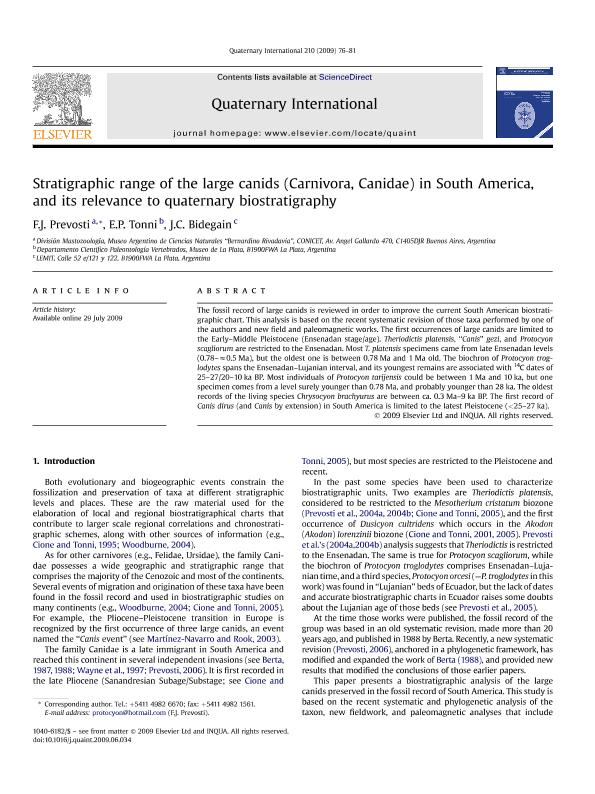Mostrar el registro sencillo del ítem
dc.contributor.author
Prevosti, Francisco Juan

dc.contributor.author
Tonni, Eduardo Pedro

dc.contributor.author
Bidegain, Juan Carlos

dc.date.available
2020-04-27T20:55:18Z
dc.date.issued
2009-12
dc.identifier.citation
Prevosti, Francisco Juan; Tonni, Eduardo Pedro; Bidegain, Juan Carlos; Stratigraphic range of the large canids (Carnivora, Canidae) in South America, and its relevance to quaternary biostratigraphy; Pergamon-Elsevier Science Ltd; Quaternary International; 210; 1-2; 12-2009; 76-81
dc.identifier.issn
1040-6182
dc.identifier.uri
http://hdl.handle.net/11336/103725
dc.description.abstract
The fossil record of large canids is reviewed in order to improve the current South American biostratigraphic chart. This analysis is based on the recent systematic revision of those taxa performed by one of the authors and new field and paleomagnetic works. The first occurrences of large canids are limited to the Early–Middle Pleistocene (Ensenadan stage/age). Theriodictis platensis, “Canis” gezi, and Protocyon scagliorum are restricted to the Ensenadan. Most T. platensis specimens came from late Ensenadan levels (0.78–≈0.5 Ma), but the oldest one is between 0.78 Ma and 1 Ma old. The biochron of Protocyon troglodytes spans the Ensenadan–Lujanian interval, and its youngest remains are associated with 14C dates of 25–27/20–10 ka BP. Most individuals of Protocyon tarijensis could be between 1 Ma and 10 ka, but one specimen comes from a level surely younger than 0.78 Ma, and probably younger than 28 ka. The oldest records of the living species Chrysocyon brachyurus are between ca. 0.3 Ma–9 ka BP. The first record of Canis dirus (and Canis by extension) in South America is limited to the latest Pleistocene (<25–27 ka).
dc.format
application/pdf
dc.language.iso
eng
dc.publisher
Pergamon-Elsevier Science Ltd

dc.rights
info:eu-repo/semantics/openAccess
dc.rights.uri
https://creativecommons.org/licenses/by-nc-sa/2.5/ar/
dc.subject
LARGE CANIDAE
dc.subject
PLEISTOCENE
dc.subject
BUENOS AIRES
dc.subject
ARGENTINA
dc.subject.classification
Paleontología

dc.subject.classification
Ciencias de la Tierra y relacionadas con el Medio Ambiente

dc.subject.classification
CIENCIAS NATURALES Y EXACTAS

dc.title
Stratigraphic range of the large canids (Carnivora, Canidae) in South America, and its relevance to quaternary biostratigraphy
dc.type
info:eu-repo/semantics/article
dc.type
info:ar-repo/semantics/artículo
dc.type
info:eu-repo/semantics/publishedVersion
dc.date.updated
2020-04-22T14:42:32Z
dc.journal.volume
210
dc.journal.number
1-2
dc.journal.pagination
76-81
dc.journal.pais
Estados Unidos

dc.description.fil
Fil: Prevosti, Francisco Juan. Consejo Nacional de Investigaciones Científicas y Técnicas. Oficina de Coordinación Administrativa Parque Centenario. Museo Argentino de Ciencias Naturales "Bernardino Rivadavia"; Argentina
dc.description.fil
Fil: Tonni, Eduardo Pedro. Universidad Nacional de La Plata. Facultad de Ciencias Naturales y Museo. Departamento Científico de Paleontología de Vertebrados; Argentina
dc.description.fil
Fil: Bidegain, Juan Carlos. Laboratorio de Entrenamiento Multidisciplinario para la Investigación Tecnológica; Argentina
dc.journal.title
Quaternary International

dc.relation.alternativeid
info:eu-repo/semantics/altIdentifier/doi/http://dx.doi.org/10.1016/j.quaint.2009.06.034
dc.relation.alternativeid
info:eu-repo/semantics/altIdentifier/url/https://www.sciencedirect.com/science/article/abs/pii/S1040618209002419
Archivos asociados
